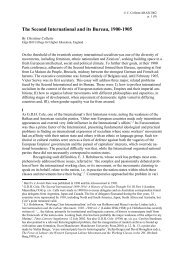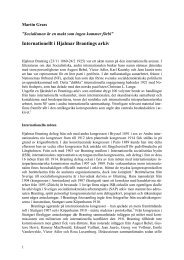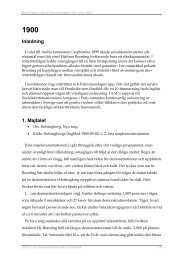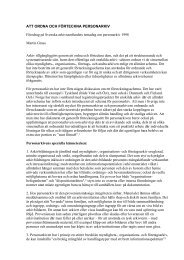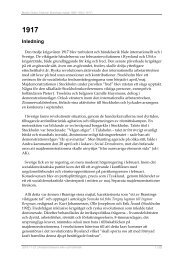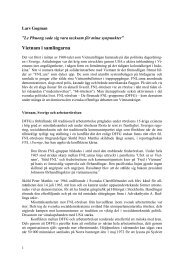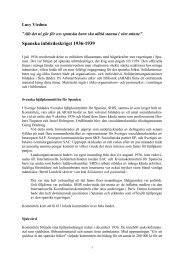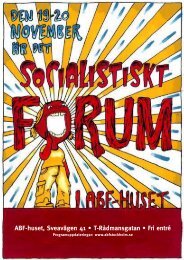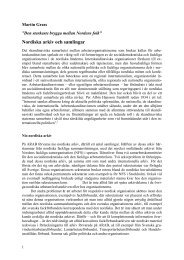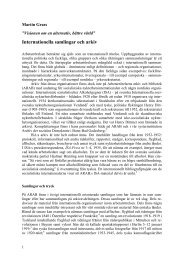Communism, Social Democracy and the Democracy Gap
Communism, Social Democracy and the Democracy Gap
Communism, Social Democracy and the Democracy Gap
You also want an ePaper? Increase the reach of your titles
YUMPU automatically turns print PDFs into web optimized ePapers that Google loves.
© S. Berger/ARAB 2002<br />
p. 7 (14)<br />
Germany Thomas Welskopp has only recently restored <strong>the</strong> early history of <strong>Social</strong><br />
<strong>Democracy</strong> to a history in its own right. He emphasised throughout that early <strong>Social</strong><br />
<strong>Democracy</strong> was part <strong>and</strong> parcel of a democratic <strong>and</strong> national-revolutionary people's<br />
movement. The commitment of its members to intra-organisational democracy with<br />
agreed written procedures <strong>and</strong> elected committees was second to none. In <strong>the</strong>ir<br />
associational culture <strong>the</strong>y practised an active citizenship <strong>and</strong> saw such active citizenship as<br />
<strong>the</strong> key to self-fulfilment. 29 Similarly, Maurice Agulhon has shown for <strong>the</strong> early French<br />
labour movement how workers in <strong>the</strong>ir associations, clubs <strong>and</strong> societies shaped <strong>the</strong>ir own<br />
public sphere <strong>and</strong> articulated a wide array of social, political <strong>and</strong> cultural concerns. 30 The<br />
early labour movement in Europe, sections of which stood condemned by no lesser gods<br />
than Marx <strong>and</strong> Engels as utopian socialists, did develop ideas about communitarianism,<br />
co-operation <strong>and</strong> self-management which have been largely ignored by <strong>Social</strong> Democratic<br />
histories. They also often preached <strong>and</strong> practised <strong>the</strong> liberation of women <strong>and</strong> a radical<br />
gender politics which would often not be matched by <strong>the</strong> left until <strong>the</strong> late twentieth<br />
century. 31<br />
Some of <strong>the</strong>se early nineteenth century traditions survived <strong>and</strong> were fur<strong>the</strong>r<br />
developed by <strong>the</strong> anarcho-syndicalist traditions of direct industrial action <strong>and</strong> workers'<br />
self-organisation. Paradoxically, some anarchist circles at <strong>the</strong> same time continued to<br />
practice strict conspiratorialism which was built on authoritarian rule <strong>and</strong> tended to<br />
disregard democratic procedure in every respect. O<strong>the</strong>rs championed <strong>the</strong> broadest measure<br />
of participatory democracy in local small-case communities of sovereign individuals who<br />
would at best co-operate in voluntary larger federations, ideally without developing<br />
intricate forms of representations. Overall, <strong>the</strong> anarcho-syndicalist mistrust <strong>and</strong> rejection<br />
of all centralist organisations <strong>and</strong> institutions, including political parties, parliaments,<br />
church <strong>and</strong> state stood in marked contrast to both <strong>the</strong> <strong>Social</strong> Democrat <strong>and</strong> Communist<br />
traditions. 32 In <strong>the</strong> revolutionary period between 1917 <strong>and</strong> 1923 council republics were <strong>the</strong><br />
aim of a number of socialist revolutionaries in central <strong>and</strong> eastern Europe. They were<br />
informed by notions of a more radical <strong>and</strong> more direct democracy which often went h<strong>and</strong><br />
in h<strong>and</strong> with dem<strong>and</strong>s for greater control over MPs, championing of plebiscites <strong>and</strong><br />
referenda as well as suggestions for <strong>the</strong> rotation principle in leadership which would<br />
prevent <strong>the</strong> kind of hero-worshipping which was so prominent in <strong>Social</strong> Democratic <strong>and</strong><br />
Communist organisations. After <strong>the</strong> First World War, left socialists formed a distinct<br />
group between Communists <strong>and</strong> <strong>Social</strong> Democrats. A number of parties joined nei<strong>the</strong>r <strong>the</strong><br />
Third International nor <strong>the</strong> Labour <strong>and</strong> <strong>Social</strong>ist International, but, in 1921, set up <strong>the</strong><br />
International Workers' Union of <strong>Social</strong>ist Parties, also known as 'Vienna Union'.<br />
Throughout <strong>the</strong> 1920s <strong>and</strong> 1930s a string of independent socialists defied <strong>the</strong> stark<br />
dichotomies between Communist dogmatism <strong>and</strong> <strong>Social</strong> Democratic reformism. Often it is<br />
among this group that we find <strong>the</strong> most interesting ideas concerning democracy.<br />
<strong>Democracy</strong> was not just seen as a political process but a mechanism of decision-making<br />
<strong>and</strong> balancing out conflicting interests which needed implementing at all levels of society.<br />
The key question was not about political power but about social power. Democratic<br />
processes needed to be adopted in all power relationships - in <strong>the</strong> family, at <strong>the</strong> workplace,<br />
in neighbourhood groups <strong>and</strong> even in <strong>the</strong> army. Ideas about industrial democracy, workers'<br />
29 Thomas Welskopp, Das Banner der Brüderlichkeit. Die deutsche Sozialdemokratie vom Vormärz bis zum<br />
Sozialistengesetz (Bonn 2000).<br />
30 Maurice Agulhon, The Republic of <strong>the</strong> Village: The People of <strong>the</strong> Var from <strong>the</strong> French Revolution to <strong>the</strong><br />
Second Republic (Cambridge 1982).<br />
31 Pamela Pilbeam, French <strong>Social</strong>ists Before Marx. Workers, Women <strong>and</strong> <strong>the</strong> <strong>Social</strong> Question in France<br />
(Teddington 2000), especially chapter 6 on '<strong>the</strong> "new" woman'.<br />
32 Marcel van der Linden <strong>and</strong> Wayne Thorpe (eds), Revolutionary Syndicalism: An International Perspective<br />
(Amsterdam 1989); David Goodway (ed.), Anarchism: History, Theory <strong>and</strong> Practice (London 1989).



